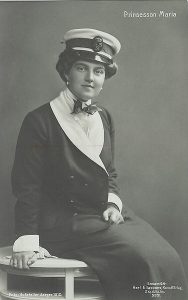Kenneth McArthur – Olympic Hero of Potch
On 10 February Kennedy Kane McArthur, locally known as Kenneth McArthur, was born in Dervock, County Antrim, Northern Ireland. He came to Potchefstroom during the Anglo-Boer War as a member of the South African Constabulary. Shortly afterwards his athletic prowess became known and he won several titles. He still holds the record to be the only marathoner who won all the marathons he entered, albeit only six. My book “Kenneth McArthur – ‘Marathon Mac’ from Potchefstroom” is available on amazon.com. A link to the amazon page is available at “Books” on the homepage.
McArthur and the Girls
When Kennedy Kane McArthur, locally known as Kenneth, won the Olympic marathon in July 1912 in Stockholm in Sweden in 1912, he was an instant success with the ladies. I wrote in my book: Kenneth McArthur ‘Marathon Mac’ from Potchefstroom:
It is generally thought that teenage girls’ hysterical reaction at the appearance of a superstar is a phenomenon that was first observed in the middle the 20th century. It seems that McArthur generated the same histrionics whenever he appeared on the streets in Stockholm.
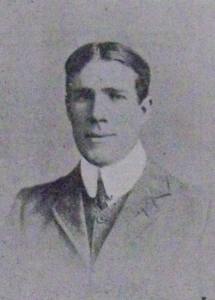
Kenneth McArthur. The photo appeared in the Potchefstroom Herald of 4 April 1912
On 6 August 1912 the Herald reported under the heading “Amongst the girls” about the myriad bouquets the hero received. His popularity is reflected in a note on a postcard from McArthur to Mr Ferrero, reprinted in the Herald. McArthur wrote that his hours for “writing my autograph” was from 9 a.m. to 5 p.m.
The week after the marathon, was described by The Winning Post of 27 July 1912, as a “grand” one for McArthur.
He went off on Saturday morning in a decorated train with bouquets all over him and the Grand Central Station full of laughing, crying girls. Everything feminine under fifty has been promenading Strandvagen the last few days, on the chance of seeing a long lean bronzed Irish jaw and about six feet of modest Irishman attached.
They strolled along in groups, and sometimes they took to the old sweet way of calling for him. I last saw him blushing a brighter bronze with a new moon of giggling girls with cameras and bouquets around him on the pavement.
One of the “girls” who wanted to meet McArthur was none other than Princess Marie, reported the Herald of 23 August 1912. On the eve of their departure from Stockholm, the South Africans were entertained at Hasselbakken, described as a “fashionable open air café”.
The Princess was seated at a table next to the South Africans. She asked that McArthur be introduced to her and then closely questioned him about his training methods diet etc.
In an interview by CV Bate of the Herald’s with McArthur in September 1912, he enquired about his meeting with Princess Marie. McArthur reluctantly “and even more modest than is his wont, replied: ‘Yes the princess saw me in the café and sent for me. She shook hands and congratulated me, spoke to me a few minutes about the race, and then shook hands again in wishing me goodbye.’”
Although they were introduced shortly before the Anglo-Boer War ended in 1902, Kenneth McArthur only married Joey Louw in May 1921 when he was 39 and she 33. They never had children.
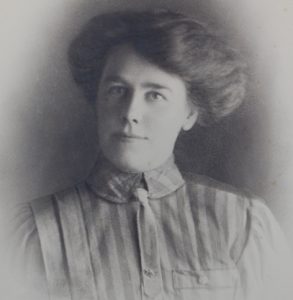
Joey McArthur (néé Louw) 1887 – 1975 Photo: Ballymoney Museum
McArthur’s arrival in Potchefstroom
McArthur only arrived in Potchefstroom in the first week of September. After leaving Stockholm he visited Ireland, where he was feted. In London a special eight course dinner was held in his honour with dishes named “Preliminary Canter”, “The Start”, “Going Strong”, “Half-way”, “Turned for Home”, “Stayers to the Fore”, “In the Straight” and “The Winning Post”.
Grand plans were made for his arrival in Potchefstroom. He was to be met at the station at 17:30 when the train was expected, by the mayor and councillors. Accompanied by the music of a military band McArthur would walk under an arch of swords and lances from the platform to the roadway. After a parade through the streets, a concert in his honour was to be held at the Lyric Theatre. The concert was called a “Smoker” since members of the audience were allowed to smoke and only men attended.
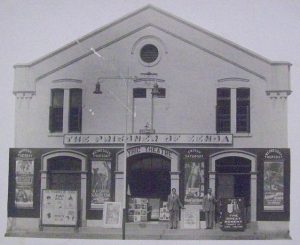
Lyric Theatre. Photo: Potchefstroom Museum
Friends and fans already started to congregate at the station from 13:00. A cinematographer was commissioned to record McArthur’s arrival on film.
The train only arrived at 20:00 as it was involuntarily stopped at stations along the way so crowds could see the Olympic hero.
By that time it was already dark and the cinematographer was unable to record his arrival.
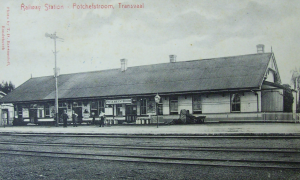
The Potchefstroom Station. It was built in 1897 when the railway line was first opened. It was replaced in 1918 by the current larger station.
The lateness did not dampen the crowd’s enthusiasm. The whole town came out to welcome the hero and it is said that only those that were severely ill did not attend. “The home-coming of Kennedy K. McArthur was marked by remarkable scenes of enthusiasm which were certainly unprecedented in Potchefstroom and probably unique for South Africa.” (Herald 6-09-1912)
An honour guard of 96 boys of the Orphanage Cadet Company and the band of the 12th Royal Lancers played on the platform. Amongst the groups there to welcome him was “flannel clad natives representing the location athletic club”.
It was estimated that at least 2 000 people had gathered on the platform and in the immediate vicinity of the station.
The train, which was “brilliantly illuminated,” steamed in at 8:15 p.m. under the tune of “See the conquering hero come”, played by the band.Kenneth’s brother Robert was the first to meet him. He then was “quickly hoisted on the shoulders of his admirers and carried to where the mayor was standing”.
The Herald was only able to interview him about a week after his arrival in Potchefstroom and the editor wrote: It is no easy matter to interview Kennedy McArthur in these days. He is pretty sick of laudation and speeches – and pressmen. He told me so this morning, when I had run him to earth, after a vigorous chase. Where I met him at last face to face will not be dragged from me by wild horses.


